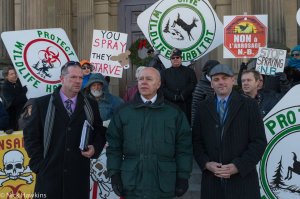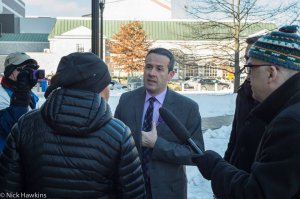
The work of New Brunswickers to ban glyphosates in forestry in the province marked a milestone on Dec. 6 when it collected the largest number of signatures to any petition ever tabled in the Legislative Assembly. To date, almost 28,000 New Brunswickers have signed a hard copy petition against spraying glyphosates in the forest in just over a year. This petition is also one of many similar petitions against herbicides in the woods that have been tabled in the Legislature in just over a decade.
The Conservation Council of New Brunswick wrote the petition that became an important organizing tool for people opposed to what they call an outdated practice of herbicide use in the forest. The Facebook group, Stop Spraying in New Brunswick, was created and quickly reached over 13,000 followers.
About 50 people, some coming from far away as the northern New Brunswick communities of Tracadie, Kedgwick and Dalhousie, gathered outside the Legislature on a chilly December day to show their support for the ban and to thank David Coon, Green MLA for Fredericton South as well as Jake Stewart, Conservative MLA for Southwest Miramichi for signing the petition.

The Hon. Serge Rousselle, Minister of the Environment and Local Government, was also present and spoke to members of Stop Spraying in New Brunswick (SSNB) about the petition. He told Caroline Lubbe-D’Arcy, a spokesperson for SSNB, that he would like his department to receive more information from the group and that he is willing to meet with them to discuss it further.
Earlier this year it was revealed that New Brunswick uses more glyphosates in forestry than any other province in the Chief Medical Officer of Health’s report on glyphosates. The report found that 40% of the forest land cut in NB in 2014 was sprayed with glyphosate compared to 28% in Ontario and 11% in Nova Scotia. While 205,859 hectares were cut in Québec in the same year, no forest lands there were sprayed with glyphosate. Québec banned herbicides in their forest in 2001 due to public health concerns.
More and more people and organizations are calling for an immediate phase-out of herbicides in the forest over the past few years. In 2014, biologists, representatives from hunting, fishing and outdoors recreation groups and environmental groups including the Conservation Council united in a call to ban herbicides in the forest. A year later, the International Centre for Research on Cancer, a branch of the World Health Organization, classified glyphosate – the active ingredient in the herbicide sprayed annually in New Brunswick – as a probably cancer-causing chemical.
Health Canada has delayed its reassessment of glyphosates in light of the growing body of scientific research on glyphosates. Last month, Health Canada, which regularly reviews all pesticides to make sure they meet updated health and safety standards, released its re-evaluation of the neonicotinoid imidacloprid and has proposed a three-year phase-out of agricultural uses of the pesticide to address risks to aquatic insects.
The Conservation Council advocates for a precautionary approach against using glyphosates in silviculture and maintains that it is time for the province of New Brunswick to adopt twenty-first century forestry and silviculture practices that protect public health, and the wildlife and diversity of life found in our forest.

